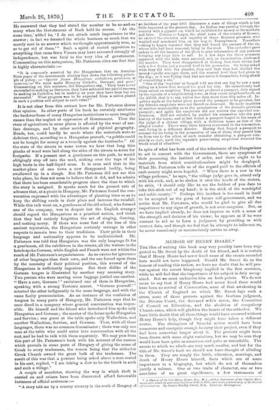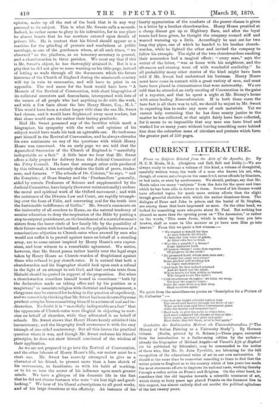MEMOIR OF HENRY HOARE.*
• A Memoir of the it Henry Hoare, Ke7., M.A., with a Sarratire of the Church Move- ments with which he was connected from 1945 to 1865, and more particularly of the Revival of Convocation. By James Brsdby Sweet, ILA. London: Bivingtons. THE idea of writing this book may very possibly have been sug- gested to Mr. Sweet by the deaths of his friend, and it is certain that if Henry Hoare had never lived some of the events recorded here would not have happened. Should Mr. Sweet do us the honour of reading this review, we have no doubt that he will pro- test against the covert blasphemy implied in the first sentence, • while he will feel that the importance of his subject is duly recog- nized. But we must undeceive him on both points. We do not mean to say that if henry Hoare had never lived there would have been no revival of Convocation, none of that awakening in the Church of England on which Mr. Sweet lays such a stress, none of those protests against the Gorhatn judgment, the Divorce Court, the deceased wife's sister, the Committee of Council on Education, and the abolition of compulsory Church-rates, which will gladden the hearts of the orthodox. We have little doubt that all these things would have occurred without Henry Hoare's help, though they might have taken a different course. The champions of Synodal action would have been numerous and energetic enough to carry their project, even if they had been somewhat longer about it. The protests might have been drawn with some slight variations, but we may be sure they would have been quite as nunterous and quite as unreadable. The events to which we allude are very much smaller, and but for the title of Mr. Sweet's book we should not have thought of alluding to them. They are simply the birth, education, marriage, and death of Heury Hoare himself, facts which are of some importance iu a biography, but which do not of themselves justify it volume. One or two traits of character, one or two anecdotes of no great significance, a few statements of
opinion, make up all the rest of the book that is in any way personal to its subject. This is what Mr. Sweets calls a memoir. Indeed, he rather seems to glory in his infirmities, for in one place he almost boasts that he has nowhere entered upon details of private life. Ile is content that his friend should appear as a machine for the grinding of protests and resolutions at public meetings, as one of the gentlemen whom, at all such times, " we observed" on the platform, as an honorary secretary in general, and a churchwarden in three parishes. We must say that if this is Mr. Sweet's object, he has thoroughly attained it. But it is a pity that he did not give us some warning on his title-page, instead of letting us wade through all the documents which the future historian of the Church of England during the nineteenth century will try in vain to summarize, and will have to print in an appendix. The real name for the book would have been "A Memoir of the Revival of Convocation, with short biographies of its collateral ancestors and descendants, interspersed with lists of the names of all people who had anything to do with the work, and with a few facts about the late Henry Hoare, Esq., M.A." This would have been a rather longer title than the one Mr. Sweet had chosen, and it would have frightmed away most readers, but that alone would earn the author their lasting gratitude.
Had Mr. Sweet possessed any of the faculties which mark a biographer, his sympathy with the work and opinions of his subject would have made his task an agreeable one. He took some part himself in the Revival of Convocation, and he always obtrudes his own sentiments on any of the questions with which Henry. Hoare was concerned. On an early page we are told that the Apostolical Succession of the Church of England is "mercifully indisputable as a fact." A little later we hear that Mr. Sweet offers a daily prayer for delivery from the Judicial Committee of the Privy Council. He fears that amongst other evils produced by this tribunal, it has seriously shaken the faith of peers, trades- men, and farmers. "The schools of Dr. Colenso," he says, " and the Essayists ; of Dean Stanley and the Freehandlers ' generally, aided by certain Professors of Science and supplemented by the Judicial Committee, have largely (however unintentionally) undone the moral and spiritual work of the Oxford movement ; and with the assistance of the Divorce Law and Court, are rapidly triumph- ing over the fears of Felix, and converting zeal for the truth into the fashionable indifference of Gallic)." Mr. Sweet's comments on the insincerity of all seceders to Rome, on the natural tendency of secular education to deny the inspiration of the Bible by putting a stop to corporal punishment, on the banishment of a married woman's sisters from the inner circle of her family life by the possibility of their future union with her husband, on the palpable hollowness of a conscientious objection to Church-rates when avowed by men who would not suffer it to prevail against taxes on behalf of a standing army, are to some extent inspired by Henry Hare's own expres- sions, and bear witness to a remarkable agreement. We notice, however, that Mr. Sweet passes rather hastily over the legal steps taken by Henry Hoare as Church-warden of Staplehurst against those who refused to pay church-rates. It is natural that both a churchwarden and his biographer should look upon such a refusal in the light of an attempt to rob God, and that certain texts from Malachi should be quoted in support of the proposition. But when a churchwarden considers himself bound in conscience "both by the declaration made on taking office and by his position as a magistrate" to associate religion with distraint and imprisonment, a clergyman maybe excused for looking to the question of expediency, and we cannot help thinking that Mr. Sweet has been deterred by some prudent scruples from committing himself to a course of zeal and in- discretion. No doubt it is "mercifully indisputable as a fact" that the opponents of Church-rates were illogical in objecting to coer- cion on behalf of churches, while they advocated it on behalf of schools. Mr. Sweet shows that Henry Hoare keenly criticized this inconsistency, and the biography itself overcomes it with the easy triumph of one-sided controversy. But all this leaves the practical question where it was, and though Mr. Sweet endorses his friend's principles, be does not show himself convinced of the wisdom of their application.
As we are not prepared to go into the Revival of Convocation, and the other labours of Henry Hoare's life, our review must be a short one. Mr. Sweet has scarcely attempted to give us a character of his friend, to present more than a bare sketch of his movements, to familiarize us with his habit of working, or to let us into the secret of his influence upon much greater minds. We have a glimpse of his domestic life in the fact that he did not choose footmen who were "six feet high and good-
looking." We hear of his liberal subscriptions to all good works, and of his large donations at the offertory. An instance of his
hearty appreciation of the comforts of the poorer classes is given in a letter by a brother churchwarden. Henry Hoare presided at, a cheap dinner got up at Highbury Barn, and after the loyal toasts had been given, he thought the company seemed stiff and wanted warming up a little. Accordingly he sent out for two long clay pipes, one of which he handed to his brother church- warden, while he lighted the other and invited the company to follow his example. The sight of the two churchwardens smoking their namesakes had a magical effect ; "every man," says the writer of the letter, "was at home with his neighbour, and the afternoon and evening went off with wonderful cordiality." In all probability many other stories of the kind might have been told if Mr. Sweet had understood his business. Henry Hoare must have come in contact with a great variety of men, and must have been placed in circumstances that were noteworthy. We are told that he attended an early meeting of Convocation in the guise of a reporter, and that he spent a night at Mr. Binney's house with some leading Nonconformists. If in both these cases the bare fact is all there was to tell, we should be unjust to Mr. Sweet in expecting him to make any more of such materials. Yet we cannot help surmising that he has done scanty justice to the matter he has collected, or that might fairly have been collected, for it seems to us impossible that any man can have lived and worked for so many years without leaving something more behind him than the colourless mass of circulars and protests which form the greater part of 550 pages.



































 Previous page
Previous page